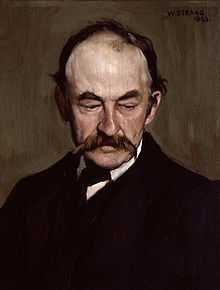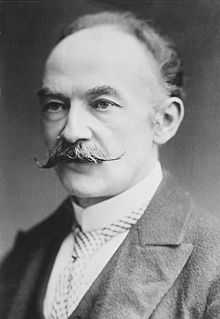The Ruined Maid

"The Ruined Maid" is a tall satirical poem by Thomas Hardy. It was written in 1866 but first published, in a slightly bowdlerized form, in 1901.[1][2]
Thomas Hardy’s “The Ruined Maid” is a satyr, and full of irony. Though this is not supposed to be a serious poem some critics say this poem is more serious than one might think due to what was going on in Hardy’s life at the time.[3] He was young and did not have his life figured out quite yet, nor did he have much of a love life.[4]
Text
"O 'Melia, my dear, this does everything crown!
Who could have supposed I should meet you in Town?
And whence such fair garments, such prosperi-ty?" —
"O didn't you know I'd been ruined?" said she.
— "You left us in tatters, without shoes or socks,
Tired of digging potatoes, and spudding up docks;
And now you've gay bracelets and bright feathers three!" —
"Yes: that's how we dress when we're ruined," said she.
— "At home in the barton you said thee' and thou,'
And thik oon,' and theäs oon,' and t'other'; but now
Your talking quite fits 'ee for high compa-ny!" —
"Some polish is gained with one's ruin," said she.
— "Your hands were like paws then, your face blue and bleak
But now I'm bewitched by your delicate cheek,
And your little gloves fit as on any la-dy!" —
"We never do work when we're ruined," said she.
— "You used to call home-life a hag-ridden dream,
And you'd sigh, and you'd sock; but at present you seem
To know not of megrims or melancho-ly!" —
"True. One's pretty lively when ruined," said she.
— "I wish I had feathers, a fine sweeping gown,
And a delicate face, and could strut about Town!" —
"My dear — a raw country girl, such as you be,
Cannot quite expect that. You ain't ruined," said she.[1]
- ^ Hardy, Thomas (1902). Poems of the Past and the Present. NY: Harper & Brothers. pp. 192–194. Retrieved 2012-03-29.
Theme
The poem depicts a young country girl who has become a rich man's mistress to escape her own poverty, and does not seem to regret her decision. Her position is contrasted with that of her old friend who is still a respectable but poor country farm worker, and who seems to envy Amelia. The poem offers an ironic comment on the lives of working class women.[5][6]
Adaptations
An "opera skit" by Seymour Barab called The Ruined Maid, based on Hardy's poem, was premiered in 1981.[7] The poem was set to music by Judith Lang Zaimont as one of her Two Songs for Soprano and Harp.[8]
References
- ↑ Hardy, Thomas (1978). The Older Hardy. Heinemann. p. 104. ISBN 0435183648. Retrieved 2 April 2012.
- ↑ Darrah, Sarah et al. (2010). English GCSE for AQA: English Literature Teacher Guide: Exploring the AQA Anthologies. Collins. p. 54. Retrieved 2 April 2012.
- ↑ Renner, Stanley (Spring 1992). William Action, the Truth about Prostitution, and Hardy's Not-So-Ruined-Maid. Virginia: West Virginia Press. p. 20.
- ↑ Renner, Stanley (Spring 1992). William Action, the Truth about Prostitution, and Hardy's Not-So-Ruined-Maid. Virgina: West Virginia Press. p. 21.
- ↑ Holbrook, David (1977). Lost Bearings in English Poetry. Barnes & Noble. p. 175. Retrieved 1 April 2012.
- ↑ Darrah, Sarah et al. (2010). English GCSE for AQA: English Literature Teacher Guide: Exploring the AQA Anthologies. Collins. p. 54. Retrieved 2 April 2012.
- ↑ Allen Hughes (7 June 1981). "Music: Debuts in Review; Soprano Duo Performs Premiere of 'Opera Skit'". The New York Times. Retrieved 2 April 2012.
- ↑ Marnie Hall. "The Vocal-Chamber ART Music by Judith Lang Zaimont". Leonarda Records. Retrieved 2 April 2012.
